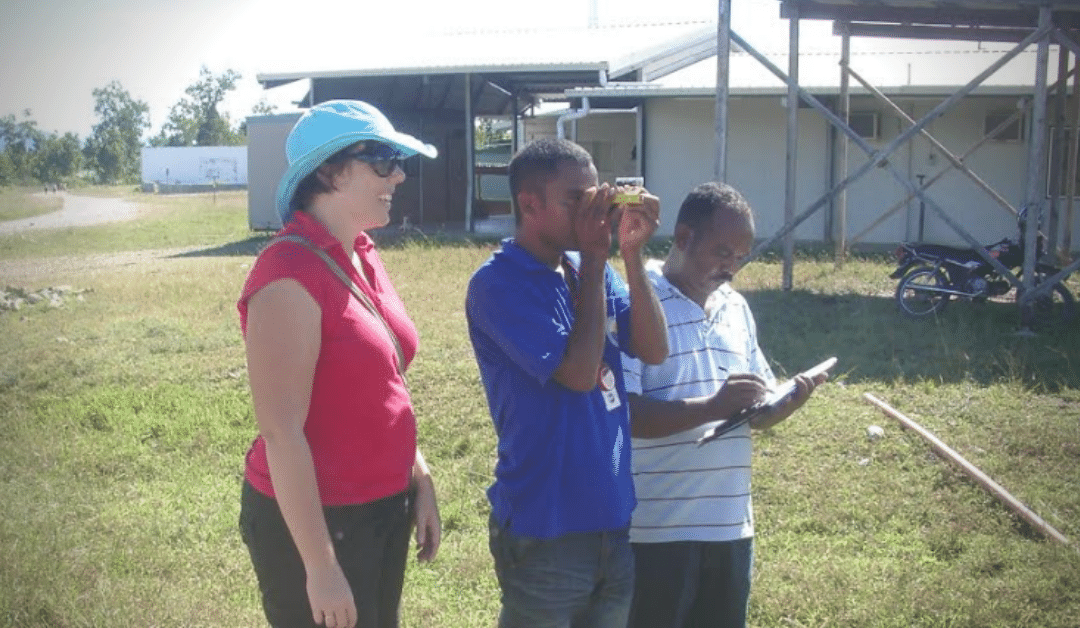Pictured: Heidi as a volunteer with EWB working with a local project team, on a water supply project, conducting a topographical survey for a water supply distribution line at a rural agricultural college in remote Timor-Leste.
This National Volunteer Week, long-time volunteer Heidi Michael reflects on what volunteering has brought her, and taught her.
———
“Volunteering is time willingly given for the common good and without financial gain.” Volunteering Australia’s Definition of Volunteering.
Volunteering. It’s broadened my skills, enriched my life and allowed me to commit to causes I care deeply about. I have had the privilege to incorporate volunteering into a large part of my life, and it’s taught me life lessons that have been pivotal in making me into the person that I am.
My interest in volunteering started early, with primary school summer holidays spent at the local veterinary clinic, swapping long summer days at the beach with grooming cats and dogs and mucking out their kennels (and I wouldn’t have had it any other way).
As my engineering career kicked off, I volunteered in my spare time with local EWB Australia chapters, holding roles on committees and projects, such as conducting energy audits for a local Indigenous business. The projects enabled me to connect directly with my local community and businesses, contribute my technical knowledge in the time I had available, and gain skills in project management and teamwork.
A few years into my engineering career, I had the incredible opportunity of a volunteer assignment with a local water and sanitation NGO in Timor-Leste, supported by EWB. I was really passionate about supporting Timorese engineers to be able to build their skills so they could support rural communities to access clean water, and I felt I could contribute my skills and knowledge to do this. For 12 months, I lived and worked in a new country, with a new culture, language, community and environment. My role required me to support the technical skills development of the local team in designing water systems, and also provide support in developing the broader organisation in areas such as financial management and HR systems.
But it was by no means a one-way exchange – and if anything, I felt learnt more than I was able to contribute!
I learnt about the construction of water systems (I had only worked on the design aspects previously) and using topographical survey equipment.
I learnt about the realities for communities living in challenging environments, particularly the difficulties in accessing areas due to remoteness, or climatic conditions that could shut down site access for months at a time. I learnt that internet and power shortages were a regular occurrence, and there was a lack of access to reliable water sources (especially during the dry season).
I learnt about Timorese culture and language. I built long-lasting relationships with Timorese family and colleagues (still strong today). I learnt a huge amount about myself. And I strengthened those “soft” (hard!) skills that have been critical in much of my professional and personal life since – communication, patience and resilience are a few traits that come quickly to mind!
More recently, I have volunteered with Women in Aid and Development because I wanted to support women to overcome structural, cultural and societal barriers they face in striving to achieve leadership roles. I am now also on the Board of Oaktree Foundation, because I wanted to support a platform for young people to have their voice heard and to be a stronger part of societies’ decision making. Both opportunities have also allowed me to gain new skills and broaden my networks.
These volunteering experiences have made my life so much richer, as well as allowed me to contribute to causes that I am passionate about. But it’s not all been a smooth ride, and there are some lessons I have learnt along the way:
- Be humble. You might bring some incredible expertise that you want to contribute, but it’s critical to deeply listen, learn and understand to know where and how your skills will best be placed to complement the local knowledge that already exists.
- Be open. Volunteering in different organisations, or countries even, will likely mean that you will encounter different ways of working, different cultures, and diverse groups of people with different worldviews – prepare yourself to respect these differences.
- Be aware. Volunteering can have a load of benefits for the organisation and yourself, but do sense check if you are taking the paid job of someone local, and ensure that the support you are providing, can be embedded in the organisation through skills transfer or capacity building so they can do it themselves into the future.
- Be clear. To ensure it is a fulfilling experience, get clear on why you want to volunteer and ensure it aligns with what the organisation needs and is trying to achieve.
Volunteering is an amazing pathway to achieving so much – to support causes that you feel passionate about and to contribute to the wider community. However, there are many other benefits that you and those you volunteer with can gain, including:
- Building relationships and working with motivated, passionate, interesting, diverse and overall wonderful people
- Learning and developing new skills and knowledge, as well as cultural, language and general life skills
- Broadening professional and personal networks and engaging with new networks and industries.
And in times like COVID-19 pandemic, volunteering is also great for your mental and physical health – it can provide a sense of purpose, keep you mentally stimulated, and strengthen your connection to the wider community.
Did you know that volunteering “contributes more to the Australian economy than mining, agriculture, defence and retail industries put together”?* It’s a statistic that shows the important contribution that our collective volunteerism creates.
Give volunteering a go. Today.
* Source: Ethical Jobs


